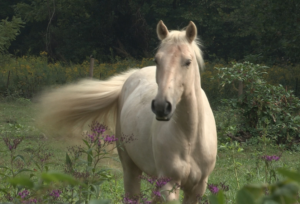Hormones in Horses and Humans
Do hormonal fluctuations wreak havoc on your attitude and performance, or your horses’?
Do you dread when it is “that time of the month” for yourself… or for your mare?
The reproductive system of females is under constant regeneration throughout most of their lives. The ever-changing hormones surging throughout the female body can cause a plethora of changes in the way she feels physically, mentally, and emotionally. This is the same for horses as it is for humans.
“That time of the month” happens more often for mares (every 21 days), and lasts a good bit longer for equines than it does for humans. Luckily mares usually only have estrus 6-7 months out of the year!
Here’s an important comparison: Women experience premenstrual symptoms (irritability, mood changes, tender breasts, menstrual cramps, etc.) for about 1-3 days prior to a menstrual cycle, and then symptoms usually subside once menses begins. Mares experience estrus for 5-7 days, which is the time when they may become problematic in attitude and performance.
Understanding the natural fluctuations of hormones within the female ovulation cycle can help one to not only understand the body’s normal functions, but also provide knowledge that can aid in managing symptoms naturally. This understanding can help the individual in attitude, mental clarity, emotions, and overall well-being.
While women have hormonal cycles that average 28 days (in our reproductive years), a mare’s cycle is on average 21 days. Women have menstrual cycles that are about 5-7 days long and horses have their estrous cycle for about 5 days,but usually only from April through September.
The hormonal cycle is thus quite similar for humans as for horses. FSH (follicle stimulating hormone) causes the production of estrogen and promotes maturation of the follicle. Meanwhile LH (luteinizing hormone) rises and precedes ovulation. Upon ovulation LH falls dramatically as progesterone production increases. High levels of progesterone occur during the luteal phase of the cycle, which occurs at about day12-26 for humans, and day 6-16 for horses.

It is during the estrogenic and LH stages that females are more likely to experience symptoms of irritability. Subsequently, it is during the luteal (or progesterone rich) stages that the female is more likely to feel balanced.
Humans have only three types of estrogens, whereas horses have over 20 types.
The molecular structure of any natural steroid hormone is exactly the same or nearly the same in humans as it is in animals and most plants. Exactly the same. The estrogen in you is identical to the estrogen in your mare, at least for the three estrogens that humans have: estradiol, estriol, and estrone.
Note that Premarin (the synthetic drug many doctors still prescribe to menopausal woman) is a conjugated estrogen product made from pregnant mares’ urine. Premarin has 21 types of estrogens in it, meaning it contains 18 types that are foreign to the human body.
Estrogens are opposed (and therefore balanced) by progesterone.
The balance between estrogen and progesterone is a primary key to the health and well-being of all females. The fluctuations between the two can be responsible for unwanted symptoms, for yourself and for your mare. An imbalance between these two hormones is sure to cause undesired conditions both physically and mentally.
All hormones are not created equal.
Even though the molecular structure of the steroid hormones is identical within the human, animal, and plant kingdom, that is not the case with synthetic hormones. Synthetic hormones are manufactured by pharmaceutical companies, and are created from an altered molecular structure that is usually very different than the natural hormones found in humans, animals, and plants.
Their differences are vastly important and widely overlooked. Here’s one way to recognize how important this understanding is:
Progesterone is absolutely essential to pregnancy, and to life itself. Without adequate levels of progesterone, conception is not possible. If levels of progesterone drop in the first trimester of a pregnancy, a miscarriage occurs. Synthetic progestins, found in prescription drugs such as Provera (used in Prempro and Depo-Provera) and birth control pills, cause miscarriages. The “Morning After Pill,” which is a combination of synthetic estrogens and progestins, is an example of such a drug.
Whereas progesterone is an absolute essential key to life, synthetic progestins can literally end life.
Many people misunderstand the difference, and yet that difference actually can impact upon the determination between life and death.
Take Medroxyprogesterone as an example, it is rather a confusing drug name, as it contains “progesterone” in the name. Yet this is Depo-Provera, which is given to humans and horses alike. Sadly, many veterinarians and doctors (gynecologists) are not aware of the differences between synthetic hormones and their natural counterpart hormones.
Since the introduction of prescription synthetic hormones (The Pill and HRT) in the U.S., there has been a corresponding increase of female-related cancers, such as breast, uterine and cervical cancer.
It has been in the news at different points in time that synthetic estrogens (such as Premarin, Prempro, and Depo Provera) may have dangerous side effects. Most women today have at least some concept of this possibility.
Going the natural way.
Natural remedies for dealing with hormonal symptoms are readily available for both humans and horses alike. Rather than adding synthetic hormones (altered molecular structure, not found in the body) into the body, we can choose to bring the body into balance and natural harmony by using natural (bio-identical) hormones and herbs.
The supplementation of natural progesterone cream has been one of the most effective remedies available for women with PMS or menopausal symptoms for over three decades.
The time has come for horses to also enjoy the wonderful benefits of supplementing with a topical metabolic toner made with natural progesterone.
In 2016 a field study was done with topical natural progesterone on mares. Eight mares participated in the study, and six of those horses were under the guidance of Dr. Joyce Harman. Dr. Jean Dodds provided saliva testing kits for hormones, testing each mare a total of four times over the course of the study. The study ran for three estrous cycles, and the cream was applied once daily for 15 days out of each 21 day estrous cycle. The saliva samples were taken before the start of the cream application and after the completion of each 15 day cycle. Daily logs were kept for each horse.
The results were very favorable. The saliva tests confirmed the balancing of hormones and the daily logs showed each mare not only responding in a positive manner, but also improving with each subsequent cycle of cream usage. The positive results mirror the same success with the supplementation of topical progesterone cream that humans have been enjoying for over three decades now.
Beyond progesterone there are also many wonderful supplements available on the market that contain herbs, along with vitamins and minerals, specifically formulated to help balance the female body for humans and horses alike. Unfortunately many of the beneficial herbs used for balancing a mare’s mood are listed as “forbidden substances” by USEF and banned by the FEI.
Every female is unique and as such will respond in her own individual way to natural remedies.
Always remember patience when trying to balance the body naturally, healing takes time. A body does not get out of balance overnight, and therefore the converse is also true: the healing and balancing process takes time. Give it time and patience, and arm yourself with as much knowledge as you can. Your mare will thank you!

Disclaimer: Serene by Nature, nor any third party associated with, related to, or linked to their businesses or websites, expressly disclaims any responsibility for, and makes no representations or warranties regarding, any statement, information, materials, or content found on or included in Serene by Nature’s marketing materials/websites, or any third party marketing materials/websites related to, associated with or linked to Serene by Nature’s business or website. Serene by Nature is not intended to diagnose, treat, cure, prevent any disease or replace proper medical care. These statements have not yet been approved by the FDA.
